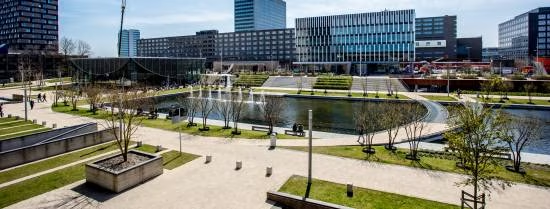Shakib Sana is literally at the centre of society. Not only as a doctor and as a researcher, but these days he can also be found at Rotterdam markets. Here, he provides information about vaccines. Together with colleagues, he tries to bring balance to the amount of disinformation. Even where people are more difficult to reach. They listen to the concerns and doubts.
"A good conversation doesn't have to end with taking the vaccine, listening is essential for connection."
Shakib Sana
Earlier this year, together with EUR alumnus internist Robin Peeters (Erasmus MC), he made a widely supported call for clear and accessible information in vulnerable neighbourhoods. Not only information was made more accessible, but also the process of getting the vaccination. Together with doctors, pharmacists, medical students, nurses, doctor's assistants and the Municipal Health Service (GGD), three small-scale and accessible vaccination locations were established in Rotterdam. In Noord, Delfshaven and the Afrikaanderwijk. In the neighbourhood, close to the people. We talked to Shakib Sana about two success factors: being a good listener and teamwork within the healthcare sector.
The market
When we speak to him, he is just on his way from Utrecht to Rotterdam. Sana: "In Utrecht too, doctors have started sharing information in an accessible location; in a shopping center. Some people are afraid, or are having doubts. It's about the story behind the story, behind every question there is often another question. We like to engage with people. It is important to keep having these conversations."
In this way, they try to bring vaccination rates in vulnerable neighbourhoods in Rotterdam to the same level as in the more wealthy neighbourhoods. And together with colleagues, they were at the forefront of realizing the accessible information and vaccination locations in the neighbourhoods, close to the people. They literally brought the vaccine to the market. In many of these neighbourhoods, vaccination rates have risen significantly over the months, sometimes even doubling. Sana: "It is important to have small and accessible locations, where we talk to people, but where people can also get their vaccination immediately. If you want to reach people, you have to go to the places where they are."
What are these conversations like?
Sana: "Today I heard different stories, sometimes about disinformation and things people read on social media. Information on social media is shared a lot, but this information is also often manipulated. But you also hear other stories. For example, from people who have already had two vaccines and think the government should enforce the requirement to wear a mouth mask before they have a third shot. Together with my colleagues, I try to strike a balance and explain reliable information, according to medical guidelines, in a clear and accessible way. And that often makes people think. It's not so much about convincing people, but more about starting a conversation.
What kind of people do you speak to?
"It is often thought that the people who do not get vaccinated are people who cannot read or write properly. But often this is not the reason. They all are people with different concerns. We try to take away the theoretical and complex communication. I always try to find ways to have a good, useful conversation with people. To really understand each other. Connection does not necessarily have to end with taking the vaccine. It's about having a conversation; listening is essential for connection."
Research
In a team of behavioural and health researchers, led by Semiha Denktas and Paul Kocken, the consequences of Covid-19 for general practitioner care in Rotterdam are being analysed. Especially in the vulnerable neighbourhoods. Sana: "The pressure on GP practices in vulnerable neighbourhoods is higher. This is due to increased health problems, and also to lower levels of self-sufficiency. People with chronic diseases visit the doctor more often. They often have problems in several areas. These include finances, loneliness or low health literacy.
Vaccination research is also carried out in accessible locations. Sana: "For example at the market, we ask people about their motives for only now getting vaccinated at these accessible locations where doctors provide information. Even though it was already their turn to get their vaccine. And at the vaccination sites, where everyone has to wait 15 minutes after the vaccination, we ask people to participate in our research. In the time that someone is waiting, they can fill in a questionnaire. As a general practitioner, I am proud to be part of this team."
Conversations and willingness to work together
According to Sana, the conversations in which we really listen and the willingness to work together within the health sector is key to success. Having a medical degree gives you a privileged position, but it does not give you any privilege. Society is welcome to ask something in return. Often, people are more complex than we think. To make your work more interesting and enjoyable and in what way you engage people is something you can shape and teach yourself."
The future
"Try to translate scientific progress to society. That society benefits from it. For example, to the patients in the consulting room, but this is relevant in every working discipline. It is important to learn your profession well, but always try to keep your ears and eyes open and listen to what people have to say. Only when we understand how complex people are, and how complex our society is, can we work on tailor-made solutions and interventions.”
- More information
Shakib Sana is EUR alumnus, general practitioner, and researcher. He is also a member of the advisory board Erasmusarts 2030. And together with Erasmus MC internist Robin Peeters he initiated gezondheidskloof.nl: "If we want to tackle the health gap in society in the future, cooperation with second-line care is important. We want to contribute to this.”

